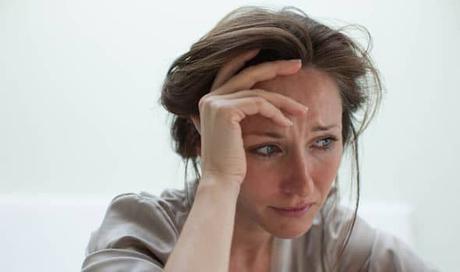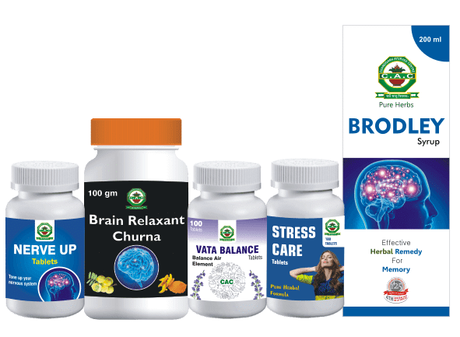
A patient with a mental anxiety disorder has symptoms of anxiety and fear, which can interfere with daily activities. Examples of anxiety disorder include panic attacks, obstructive compulsive disorder, and post-traumatic stress disorder. At the same time, its symptoms include stress and for its treatment, including antidepressants, counseling and medications.
What is Anxiety Disorder?
It is a mental disease, in which the patient has a feeling of negative thoughts, discomfort and fear with a sharp restlessness. Like, sudden hand tremors, sweating etc. If not treated properly in time, it can be very dangerous and can also cause epilepsy. Later on, the patient can also harm himself.
There can be many types of anxiety.
The patient may have pain or stiffness with type of anxiety. It can also become the first cause of heart related diseases. If the anxiety stays for a long time, then the patient starts having depression, hypertension, and blood pressure problems.
- Social anxiety: In this, the person is very nervous to talk with a stranger. Try to avoid going to crowded places or social gatherings. When surrounded by people in the party, they feel unconfirmed and uncomforatable to the extent and they start sweating, coughing or hiccups.
- Body image anxiety: This anxiety is seen more in the younger age group of 18-35 years. They are concerned about the shape, size, weight, length of their body. They become so much confused about their body that they either start eating too much or give up eating. Do not live a healthy life.
- Generalized anxiety disorder (GAD): The patient gets used to thinking unnecessarily negative or excessively in everything. They feel that they have all the problems and this causes them to behave abnormally or not be able to do their daily routine work properly. Gradually, they also become physically ill. Their immunity starts to become weak and problems like body pain, weakness are seen.
- Obsessive compulsive disorder: In this, the patient is constantly worried and afraid. Strange habits develop in him as soon as a person has a craze for cleaning and he keeps on wiping clean things again and again.
What are the symptoms of anxiety disorder?
- Worry a lot Worrying about small things in life is a symptom of anxiety. Due to this, even normal daily tasks are not done. For example, worry about water getting ruined, rupee going away, etc.
- Having excitement when someone is very upset, his sympathetic nervous system becomes very fast and due to this, the heartbeat increases, sweating, the body starts to vibrate and the mouth also starts to dry up.
- Fatigue Long-term feeling of fatigue can also be an anxiety disorder, so it is very important to find out whether this fatigue is due to some other reason or because of anxiety. If fatigue is due to headaches or nervousness, then it is a symptom of anxiety and over-worrying cause’s sleepiness as well as stress.
- Similarly, irritability, feeling of tension in muscles, difficulty sleeping, and difficulty in getting along with people is also a symptom of anxiety disorder.
Causes of anxiety disorder
- Family History: People who have ever had a history of mental health problems may have problems with multiple anxiety disorders. For example, if the grandfather had this problem, the grandson may show signs of it.
- Stressful environment: Conditions such as stress or sudden death of a friend or breakup from a girlfriend where you work can be symptoms of an anxiety disorder.
- Health related matters: Any physical problem such as thyroid, asthma, diabetes or heart disease can also cause anxiety disorder. People with depression may also suffer from anxiety disorder. If a person has been suffering from depression for a long time, then his / her methods start to decline.
- Drug abuse: Many people resort to alcohol and other intoxicants to relieve their grief, but these drugs can never get rid of anxiety disorder but will make the problem more serious. The person will become intoxicated etc. and once the effects of intoxication are over, there will be an increase in anxiety with the summons.
- Personality related disorder: Some people also fall prey to anxiety in the course of perfection. They do not like anything, but much of their time is spent trying. But when this stubbornness of perfection becomes a feat or a kind of craze, it creates an anxiety disorder.
Treatment of anxiety disorder
- Psychotherapy: First of all, go to a good psychiatrist and start your treatment with the help of psychotherapy. In this therapy, training to control the mind is given. Stay tuned for time and do everything with your heart and with pleasure
- Cognitive Behavior Therapy (CBT): Changes the learning and thinking patterns of the patient. In this, behavior modification is taught to the patient through brain tuning exercises, mind and thoughts activities. This helps him to keep pace with complex situations and keep the brain calm.
- Psychoanalysis Therapy: If the patient is an adult and has a trauma during their childhood, then explore and heal them.
- Hypnotherapy or Hypnosis Therapy: Hypnotherapy or Hypnosis therapy is also used like clinical psychology. Hypnotherapy is done in many cases when the patient is not able to eject his memories or is unable to tell the root cause of anxiety.
- Visualization and Systematic Decentralization Technique: Through these techniques, anxiety is gradually enhanced so that the patient is mentally prepared to withstand it. This increases the patient’s mental strength.
- Do not be alone: Always be busy doing something, never leave yourself alone. If there is no desire to do anything, then go to sleep and sleep full.
- Healthy diet: Eat fresh fruit, vegetables, whole grains and fat foods in anxiety disorder. Keep in mind that whenever you have food, do not leave it incomplete, eat it whole. Discard outside and unhygienic food.
- Eat food on time: If you troll about food, do not eat at a fixed time, then the balance of the body gradually deteriorates and has an effect on your mental health. An anxiety disorder is also one of them.
- Listen to music: Who does not like music, everyone has their own favorite singer and song, which they like to dance on. Blood pressure is normal by listening to songs and at the same time heart rate is also normal. Music is also called the biggest stress booster, so listen to the song of your choice whenever you are concerned.
- Do exercise or yoga: Give at least half an hour to exercise or yoga every day. It is even better if you can do more than half an hour. If there is boredom in exercise and yoga, one can play sports, such as cricket, football, badminton etc.
- As far as possible sleep, but do not sleep, avoid sleeping pills.
- Avoid smoking and alcohol, these things increase anxiety.
- Water should be drunk as much as possible so that detoxification occurs in your body. This leads to negativity.
- Anxiety patients should understand their problem and be ready to overcome it.
Ayurvedic View of Anxiety
According to Ayurveda, anxiety is caused due to imbalance of Vata dosha in the human body. When Vata dosha gets imbalanced, it gets accumulated in the nervous system and the person experiences increased anxiety in the form of insomnia, a restless mind, nervousness, panic and fearful thoughts.
The reason behind the anxiety disorder is Pragya Apradh. Pragya apradh is defined as the unhealthy adaptation of physical and mental things that leads to mental imbalance. The improper diet and lifestyle leads to the disturbed state of mind and causes negative feelings to overwhelm the mind. This causes the obstruction of Manovaha Srotas which leads to the imbalance of Vata dosha and hence causes the anxiety disorder.
Ayurvedic medicine for Stress or anxiety

1. Brodley Syrup:
This syrup maintains the overall activity of the brain. As the herbs used for the preparation of this syrup are Brahmi (Bacopa monnieri), Shankhpushpi (Convolvulus pluricaulis), Dhania (Coriandrum sativum), Ashwagandha (Withania somnifera), Saunf (Foeniculum vulgare), etc. These all act as a mind relaxant. It is the best Ayurvedic medicine for anxiety. The use of this syrup provides good results to the dementia patient. This syrup has the best memory boosting power and helps in increasing the blood flow to the brain. It is used as an antioxidant that increases the retention power
Recommended Dosage: Take 2 teaspoonfuls twice daily
2. Brain relaxant churna:
This churna is a pure Ayurvedic preparation that contains Amla (Emlica officinalis), Sonth (Zingiber officinale), Pippali (Piper longum), Marich (Piper nigrum), Haldi (Curcuma longa), Bala (Sida cordifolia), Suddha gandhak, Lauha bhasma, etc. It is mainly used for the treatment of psychiatric conditions, speech problems, to improve intelligence and also beneficial in sleep disturbances, panic attacks, phobia, and relieves stress. It is one of the best Ayurvedic medicines for depression.
Recommended Dosage: Take 1 tablespoonful twice daily.
3. Stress care tablet:
Stress care tablets are pure herbal formulation considered as best Ayurvedic tablet for stress prepared from ingredients like Sarpgandha (Rauwolfia serpentine), Brahmi (Bacopa monnieri), Jatamansi (Nardostacys jatamansi). The herbs used for the formulation of these tablets show antioxidant, anti-inflammatory, anti-stress, anti-depressant, & immune-modulator properties. These herbal tablets give good results in Stress, Depression, Anxiety, All neurological disorders, Increases intelligence, and Improves memory.
Recommended Dosage: Take 1 tablet twice daily.
4. Nerve up tablet
Nerve up tablets help in balancing the vata dosha. It reduces kapha dosha, and acts as nervine stimulant. It shows effective results in improving the central nervous system. It contains natural ingredients like shudha kuchala, shudha shilajeet, abhrak bhasma, praval pishti, shankh bhasma etc. This tablet helps in the symptoms related to Alzeihmer patient.
Recommended Dosage– Take 1 tablet twice daily.
5. Vata balance tablet
It is a rejuvenating blend of herbs is specially formulated to balance Vata doshas without aggravating Pitta or Kapha doshas. For those with a dual constitution that includes Vata or a tridoshic constitution, it is an excellent formula for the Vata season, which in most parts of the world is autumn and early winter. This is the time when Vata gets aggravated. Healthy Vata contains herbs that help the system remain balanced throughout the season. The main ingredients are trikatu, triphla, giloy, nirgundi, and vatsnabh. All these help to pacifies Vata doshas. Vata is characterized by the properties of dry, cold, light, minute, and movement. Pain is the characteristic feature of deranged Vata. Some of the diseases connected to unbalanced Vata are stress, anxiety, restlessness, depression,flatulence, gout, rheumatism, etc.
Recommended dosage: Take 1 tablet twice daily with normal water
